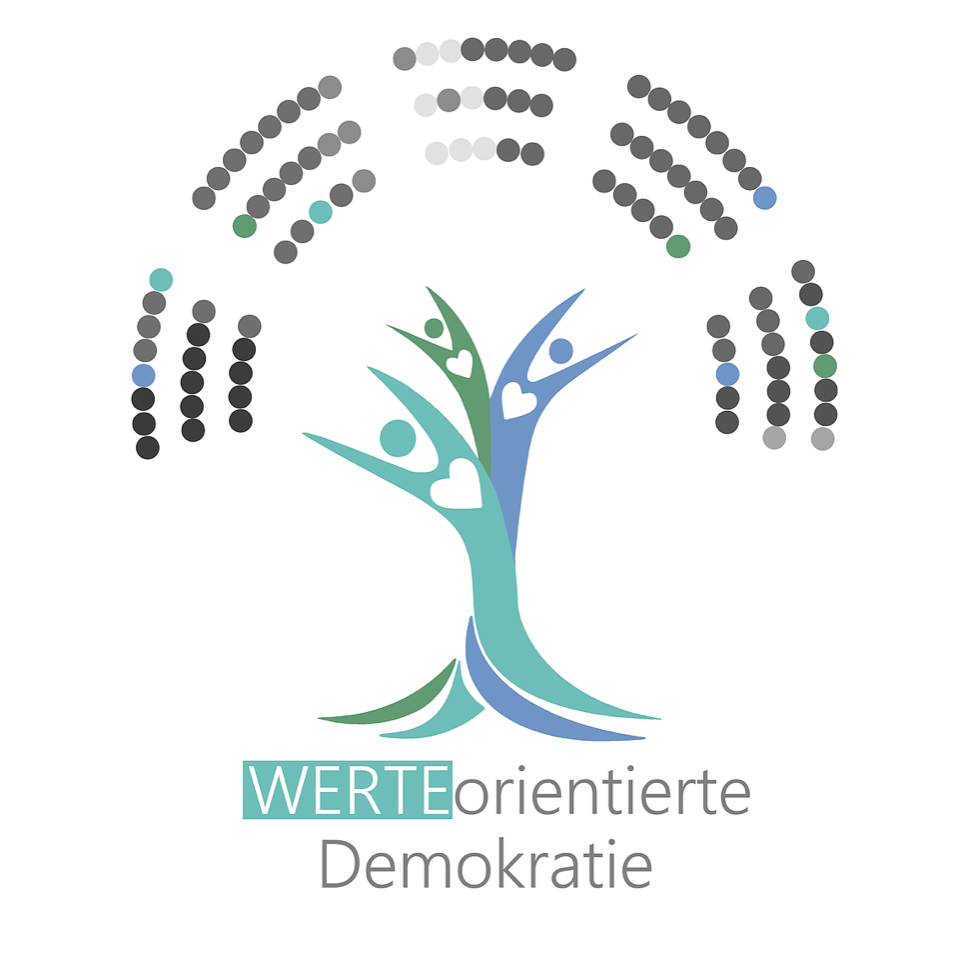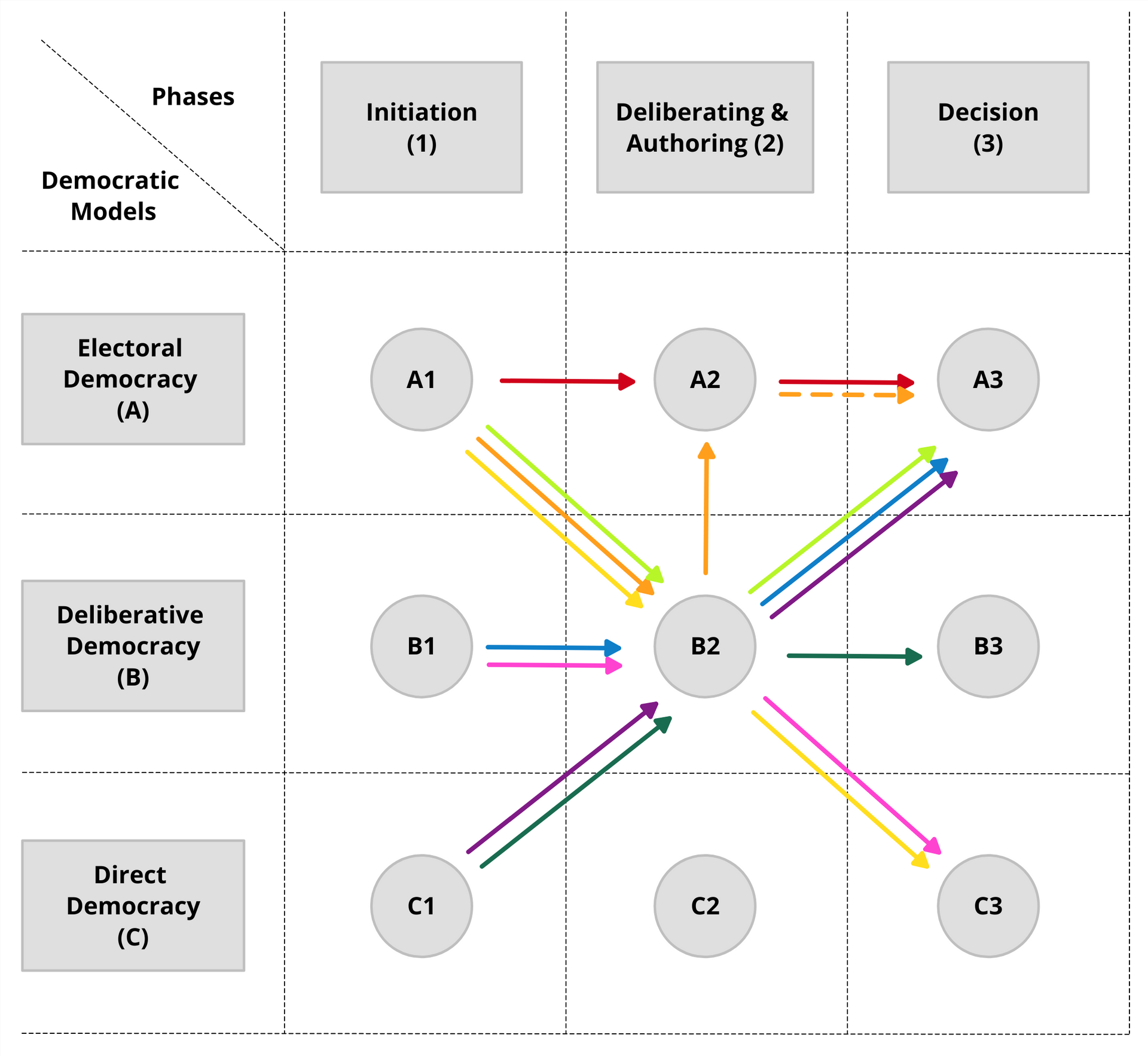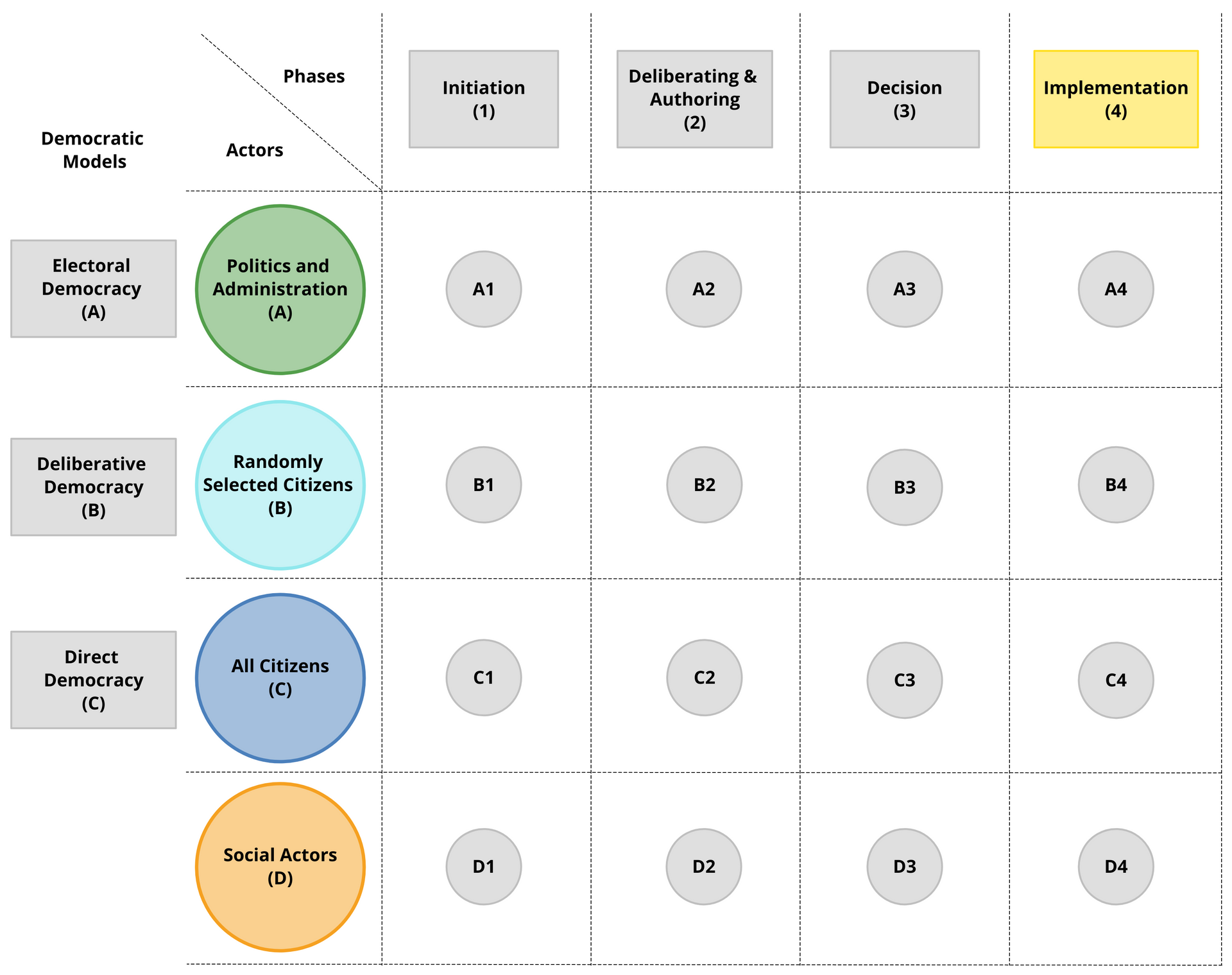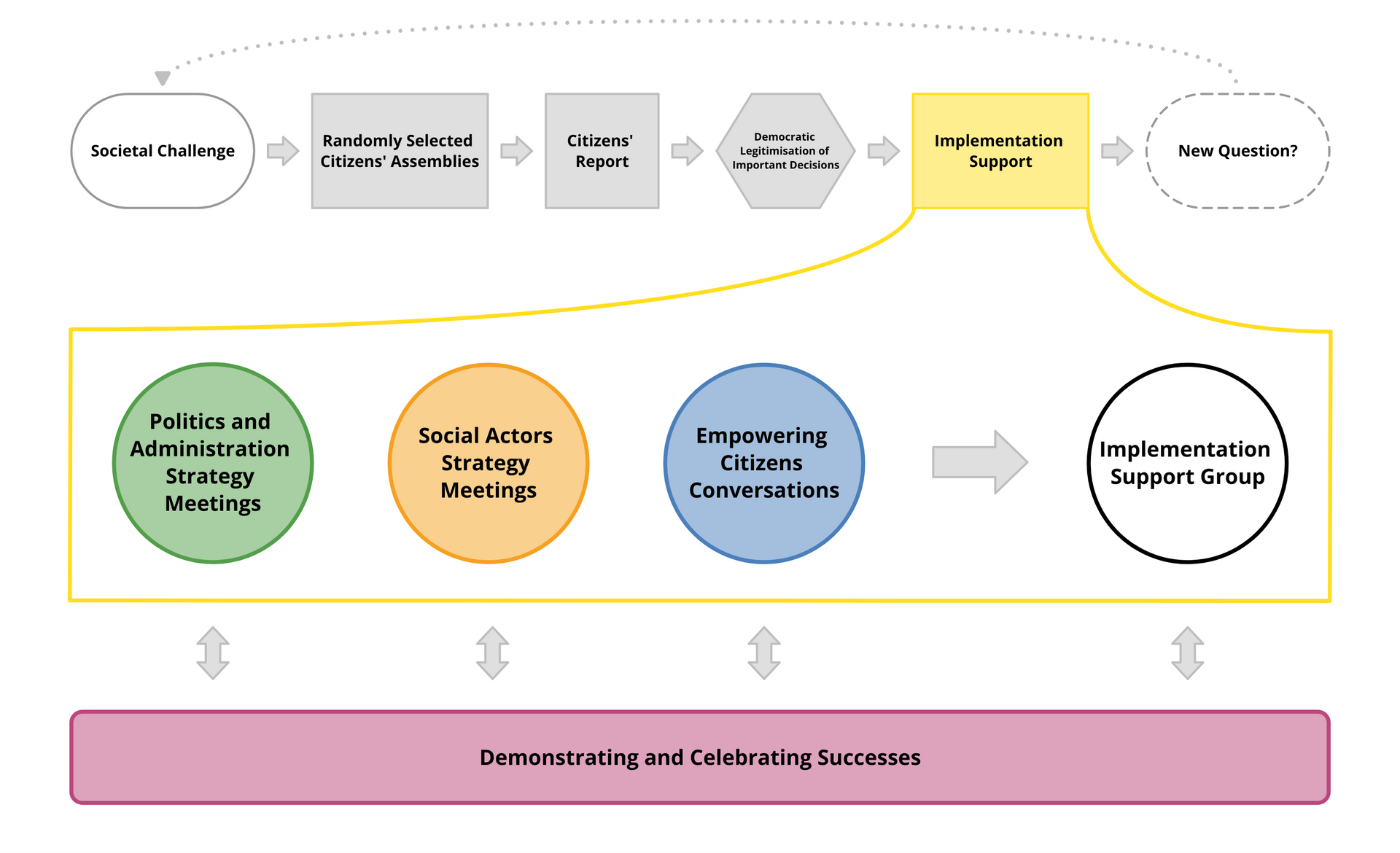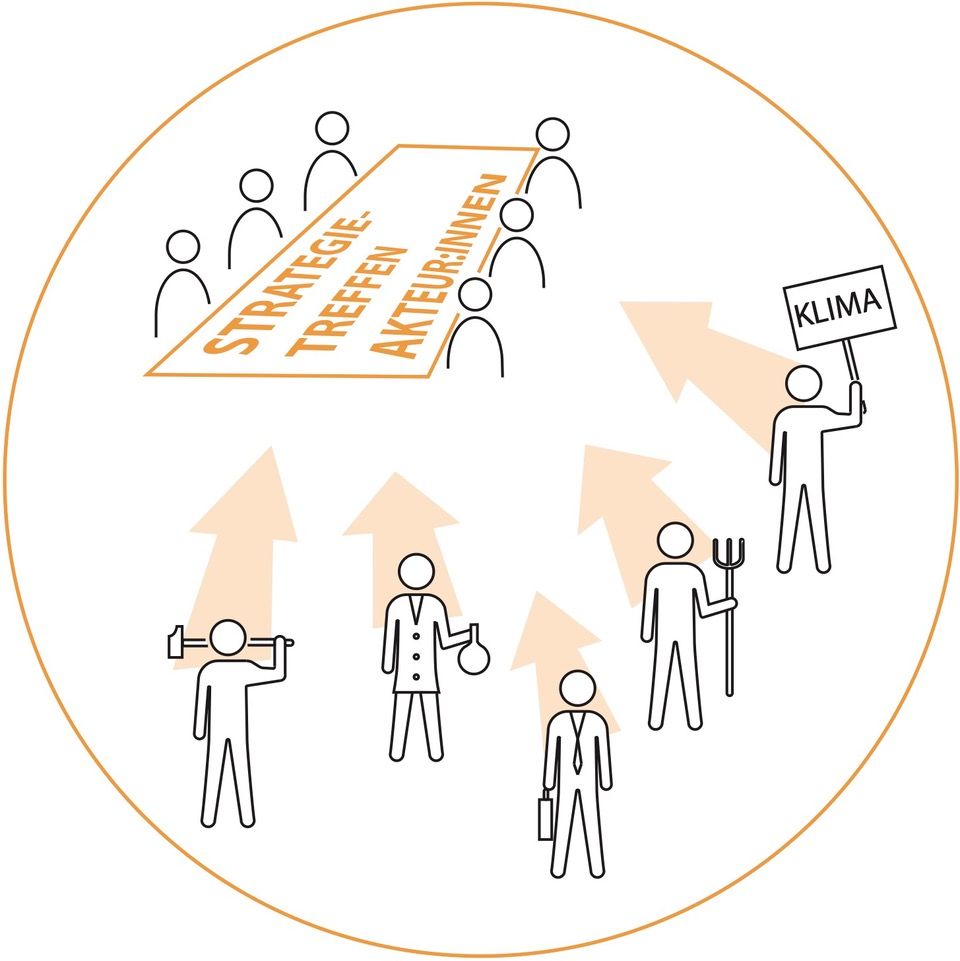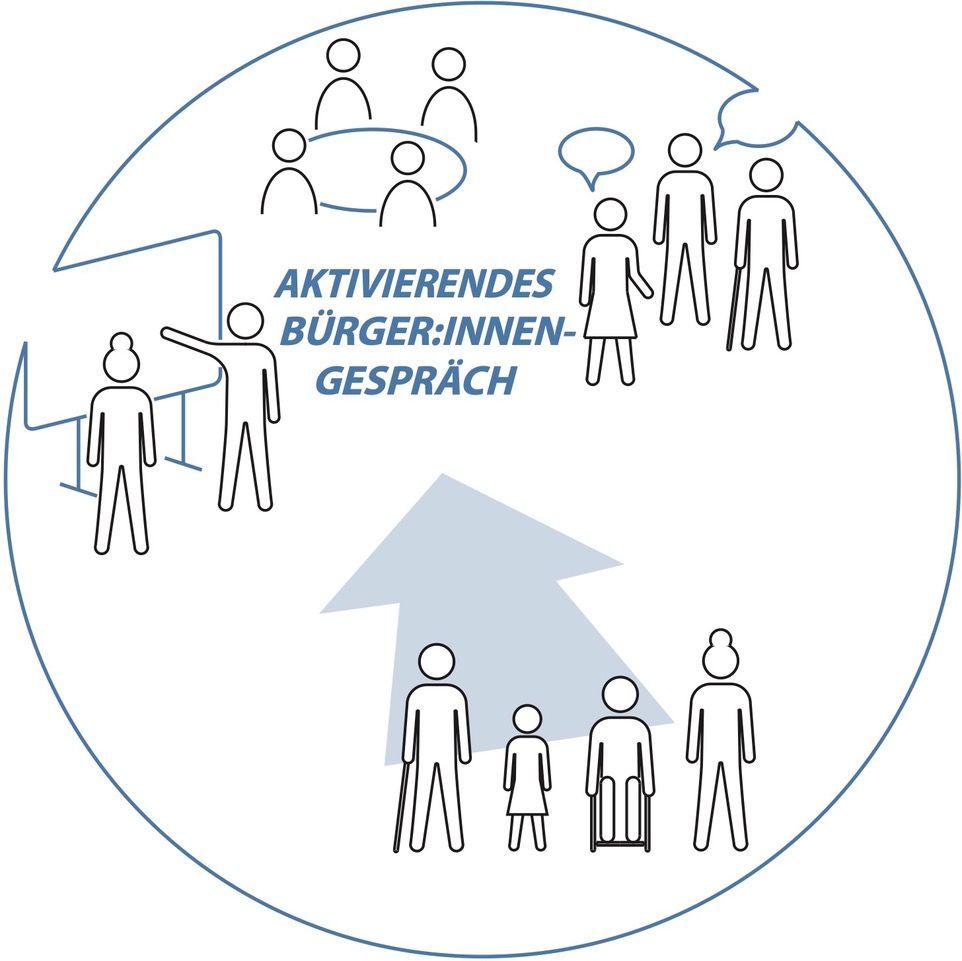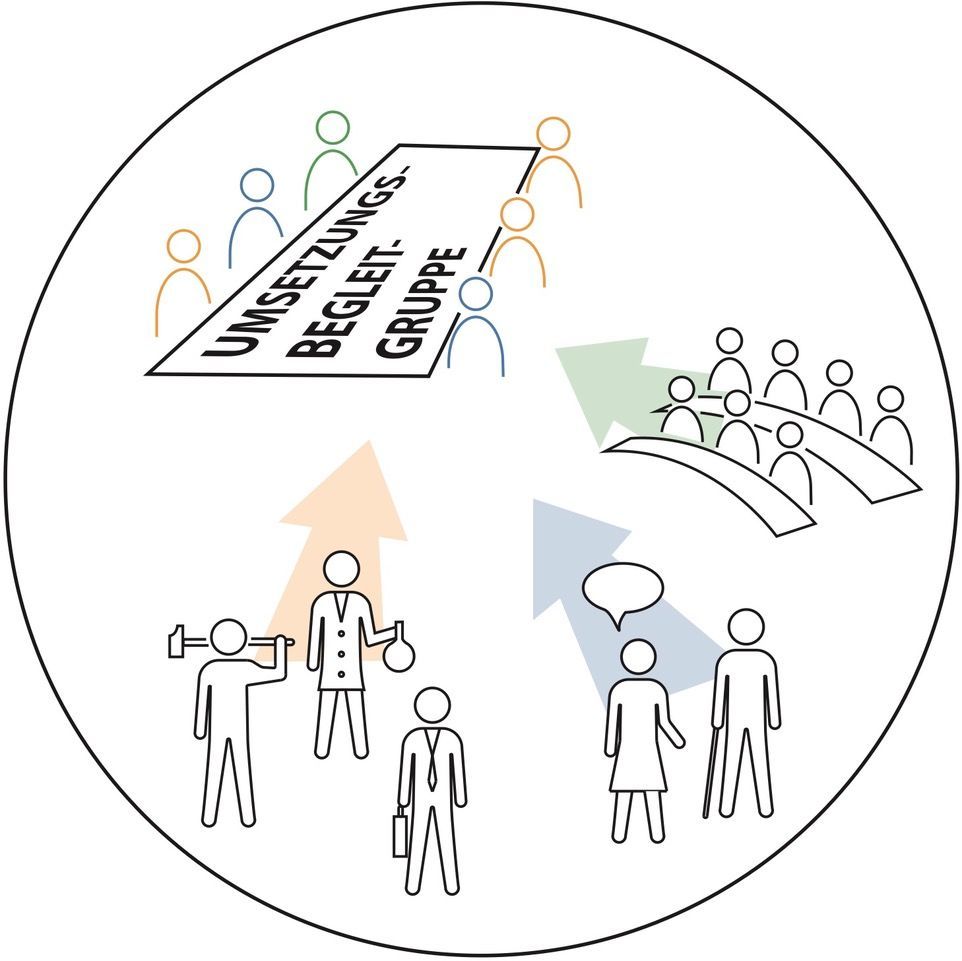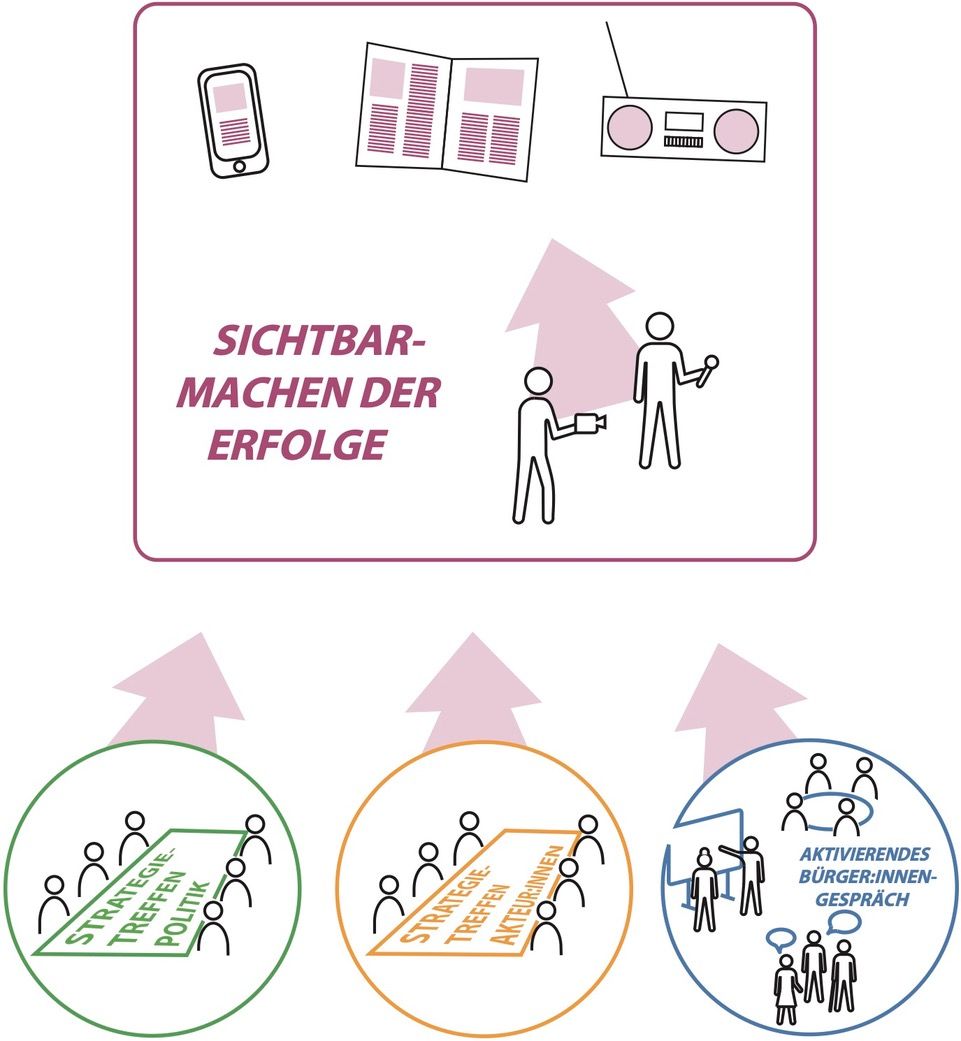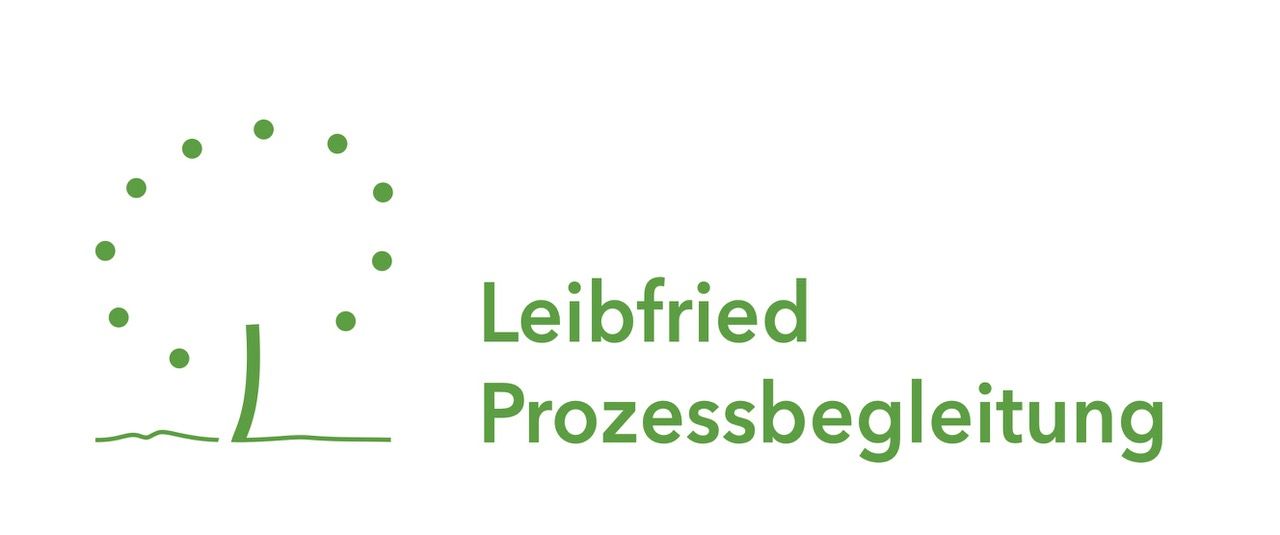Citizens' Assemblies PLUS
No Transformation Without Implementation
How can democracy continue to survive and thrive in the global competition with other political systems?
A vibrant democracy must ensure democratic dialogue, democratic decision-making and democratic capacity for action, all of which must go hand-in-hand with democratic learning (...and a sufficient willingness to put in the effort by all citizens is also a necessity).
Democracy needs democratic innovation in order to stay alive.
Stratified randomly selected Citizens' Assemblies represent a key democratic innovation.
In order to realize their potential to the fullest, we have to foster them collaboratively.
Citizens' Assemblies PLUS are Citizens' Assemblies with systematically planned implementation support. Democratic decisions should not simply fade and be forgotten: as many actors as possible must be involved in active implementation. This significantly strengthens the democratic transformation power of Citizens’ Assemblies.
We present a model that serves to adequately design participation processes.
Citizens' Assemblies PLUS was developed by Leibfried Prozessbegleitung, AllWeDo e.V. and The ECI Campaign and published in 2023.
We invite all those interested to further advance and vitalize this model with us!
Fostering Citizens' Assemblies Collaboratively
Citizens' Assemblies are proven and continue to experience a significant upsurge. However, Citizens' Assemblies concerning complex challenges have yet to usher in major breakthroughs. Because of this, Citizens' Assemblies are now being criticized more frequently. In other words: it is becoming very clear that it is neccessary to pay more attention to and systematically approach the follow-up and implementation of citizen-assembly recommendations.
We are at a crossroads: if the impression arises that Citizens' Assemblies “don't make a difference,” participation as a whole might be discredited. Therefore, we need to further cultivate and develop Citizens' Assemblies if they are to contribute to strengthening the democratic capacity to act and to bolster our vibrant democracy in the global systems competition. What can be done?
1. The Type of Challenge Is Crucial
The characteristics of the challenge are critically relevant for the process needed to solve it.
- Does the challenge present an understanding problem, i.e., is there merely a lack of knowledge, social dialogue, understanding of different perspectives and exchange? Then a well conducted dialogue process is needed.
- Does it present primarily a decision problem, e.g., a yes or no question that can be signed into law or implemented simply? Then a deliberation and negotiation process and the ensuing democratically made decision are needed.
- Or does it present an implementation problem, such as the case with the current, monumental issue of climate action? Then democratic negotiations and decisions are not sufficient: a collective implementation process must follow.
2. Think the Process Through to the End According to the Challenge
Identifying the type of challenge makes it possible to choose an appropriate process that is needed to solve the challenge. It also strengthens the ability to act. The significant phases of successful action are:
- initiate a process
- collectively deepen our understanding
- decide
- implement
Therefore, during the initiation phase of a participation process, it is essential to ensure the willingness to adequately address all necessary phases and to follow through until the end.
If process flows are chosen that do not match the challenges, the ability to act cannot be strengthened and the lack of success leads to frustration for everyone involved.
When complex implementation problems are concerned, the decision-making and implementation phases should be designed and appropriately budgeted from the outset.
3. Incorporate All Actor Levels
In order to effectively strengthen the democratic capacity to act in the face of complex societal challenges, all essential actor levels should be addressed and engaged as much as possible: politics, administration, citizenship, business, science, organized civil society and other institutions. At every step in the process, all levels of actors have different opportunities to make an impact. Transformative success can only be attained by an interconnection and integration of all levels.
Essential Elements of Citizens' Assemblies PLUS
- Implementation support ensures that the results of the CA are pursued in democratic and transparent fashion.
- There is a far-reaching involvement of different levels of actors for collective implementation: politics, administration, citizenship, business, science, organized civil society and other institutions cooperate together.
After all, complex societal challenges require societal negotiation processes — and the democratically legitimized, collective implementation of jointly supported solutions.
For future Citizens’ Assemblies, we recommend that:
- The process should not end with the citizens' report: the decision and implementation must be conceptually planned, actively supported and financed from the outset. To this end, new formats should be developed and tested.
- Citizens' Assemblies recommendations should be addressed to a more diverse audience than simply political bodies: all levels of society should be involved in the implementation of transformative processes.
Introducing the Model: Weaving Together the Three Pillars of Democracy
Berg and Nicolaidis propose a model in which Citizens' Assemblies are embedded in various real or possible courses of action and in which the three pillars of democracy play equally important roles.
Classic democratic decision-making processes contain three phases: (1) initiation, (2) deliberating and authoring and (3) decision. These three phases can be connected with all three pillars of democracy: (A) electoral democracy, (B) deliberative democracy and (C) direct democracy. The model provides a quick overview and a deeper understanding of contribution opportunities and power relations in political decision-making processes.
The arrows in the adjacent diagram are examples of possible process sequences. The descriptions can be found below.
For dialogue or decision-making problems, the Citizens' Assembly typology presented here is very suitable for making conscious decisions about where which procedure and which form of democracy should be used and interlinked. However, the model has its limitations when confronted with matters of implementation. Therefore, we propose a twofold expansion of the model .
Model Expansion: Looking at All Levels of Actors and Implementation
In order to fully exploit the democratic capacity to act on complex challenges, the model must be supplemented by (D) major social actors and (4) the implementation phase. In addition to politics and administration (focus on electoral-representative democracy), randomly selected Citizens' Assemblies or similar formats (formats of deliberative democracy) and all citizens (addressed by direct democracy), other social actors must also have a seat at the table — in particular business, science and organized civil society. These actors can also initiate a negotiation process, play a significant role in providing sound advice and (co-)decide on possible solutions.
Citizens' Assemblies PLUS: from Start to Implementation
Implementation support provides (participatory) formats to each actor level. These formats are embedded in a holistic process.
The diagram shows a prototypical process flow of Citizens' Assemblies PLUS. It illustrates clearly that the results of the deliberative or negotiation process— the citizens' report of the CA — are not the end of the process; they are an important milestone along the way. The process must be continuously evaluated and adjusted as necessary. Two essential elements for success are the transparent presentation of developments and the joint celebration of successes and achievements.
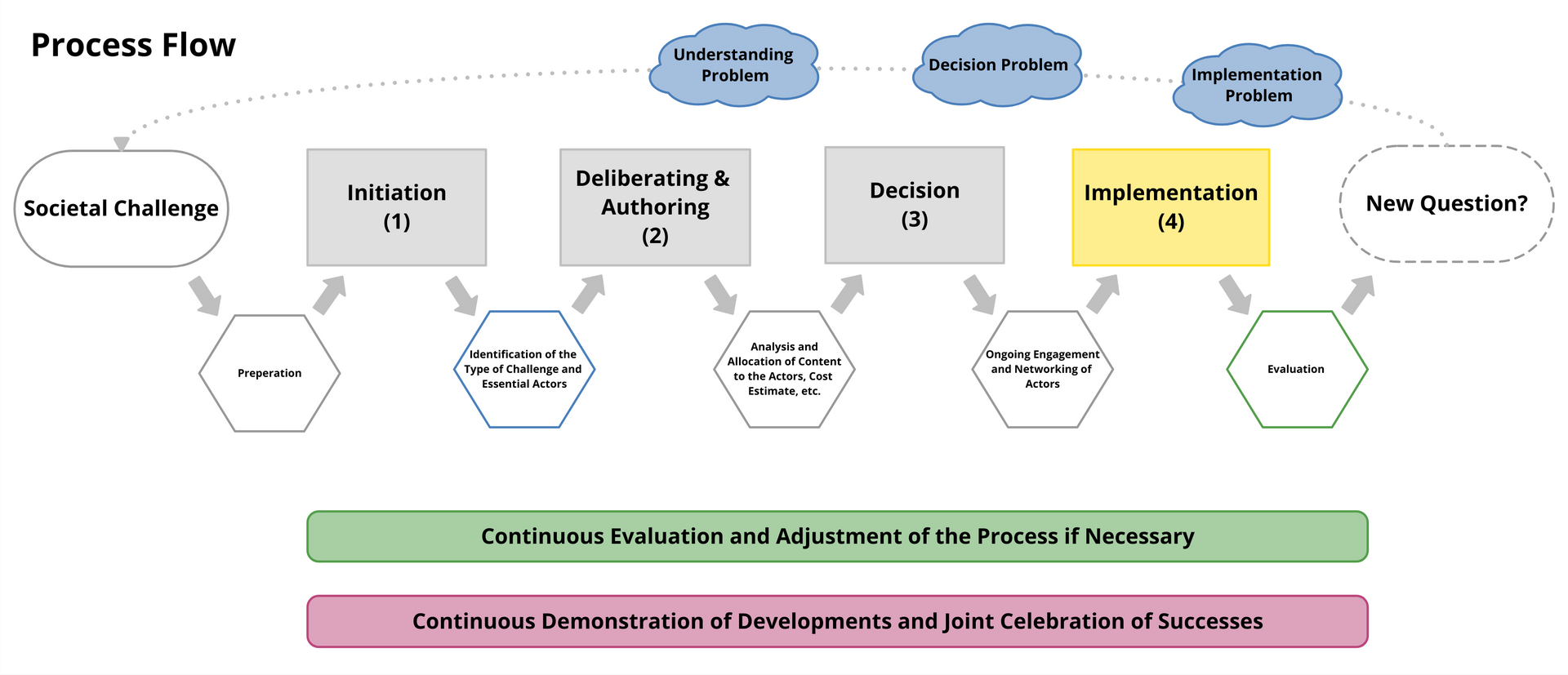
Contribute:
Collaboratively Developing a Diverse Range of Participation Formats
Citizens' Assemblies PLUS provides the theoretical framework for conceptualizing and reflecting on a process design. The concept can then be realized by the concrete implementation of a variety of formats. The implementation level (municipal, state, federal, EU…) plays an important role in the selection of formats. Citizens' Assemblies PLUS means developing and using formats for all levels of actors in every phase. The Freiburg Citizens’ Assembly model exemplifies one comprehensive design variant.
We invite and encourage all those interested to further cultivate and vitalize Citizens' Assemblies PLUS and to contribute examples of successful formats for all levels and phases!
We hope that soon there will no longer be "merely" Citizens' Assemblies but "Citizens' Assemblies with implementation support" in which initiators and implementers of the Citizens' Assemblies commit themselves to design the democratically legitimate collective implementation of the developed solutions from the outset.
Our vision is to develop a collaborative online plattform with best-practice examples of implementation concerning the phases of dialogue, decision-making and action, a platform that can serve as a source of inspiration for society and as a design tool for effective participation processes, open for everyone.
If you would like to get involved, please contact us.
The Freiburg Citizens' Assembly Model:
One Design Variant of Citizens' Assemblies PLUS
The Freiburg Citizens' Assembly model was developed as part of the Climate Citizens' Assembly (KBR) of the Freiburg region and has been piloted in the Freiburg region since 2022.
Elements of the Freiburg Citizens' Assembly Model in Detail
Clicking on the respective elements of the Freiburg Citizens' Assemblies model opens a description.
Background of the Freiburg Citizens' Assembly Model
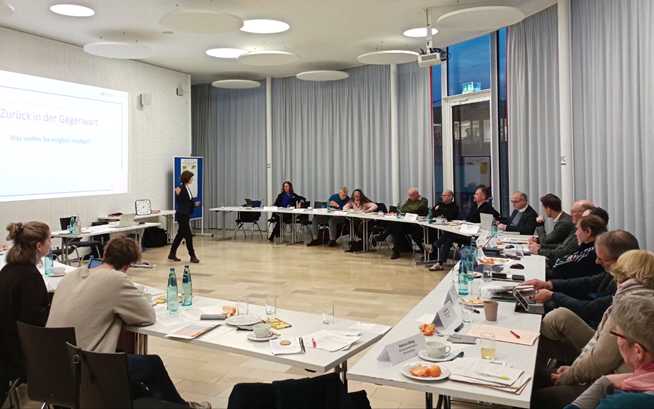
Politics and Administration Strategy Meeting for implementation support following the Climate Citizens' Assembly in the Region of Freiburg in December 2022 (Photo: Daniel Hiekel, AllWeDo eV)
The Freiburg Citizens’ Assemby model — a design variant of "Citizens' Assemblies PLUS: No Transformation Without Implementation" — is currently being piloted in the region of Freiburg. Conceptionally directed by Leibfried Prozessbegleitung, Germany's first intermunicipal Citizens' Assembly was realized in 2022: The Climate Citizens' Assembly (CCA) in the region of Freiburg. The CCA was initiatied by a citizens' initiative. It was commisioned by the city of Freiburg and 15 surrounding municipalities and implemented by the non-profit association AllWeDo e.V.. In 2023, among other accolades, the CCA received the award "Gute Bürgerbeteiligigung". AllWeDo e.V. financed a substantial share of the concept development for the implementation support in the region of Freiburg.
Contact
If you have any questions, suggestions or would like to get involved, please feel free to contact us:
info [at] buergerrat-plus [dot] de



